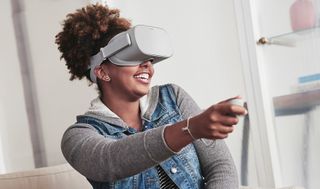Massive Apple VR leak reveals headset price, release window

What you need to know
- A new report says Apple's VR headset will be a niche, pricey product costing as much as $900.
- Bloomberg's Mark Gurman says Apple is testing the device using some chips that are faster than the M1.
- Gurman says the product could come as soon as next year.
A new report from Bloomberg's Mark Gurman says that Apple's VR headset will cost well over $900 and could be faster than Apple's M1 Macs.
From the report:
Apple Inc.'s first crack at a headset is designed to be a pricey, niche precursor to a more ambitious augmented reality product that will take longer to develop, according to people with knowledge of the matter. The initial device has confronted several development hurdles and the company has conservative sales expectations, illustrating how challenging it will be to bring this nascent consumer technology to the masses.
Gurman says the headset will be a "mostly virtual reality device" displaying "an all-encompassing 3-D digital environment for gaming, watching video and communicating." AR functionality of the headset will be "more limited."
According to the report, Gurman said Apple "has planned to launch the product" as early as 2022. The headset is apparently in the late prototype stage and hasn't been finalized, meaning it could still be scrapped by Apple.
Gurman says that Apple's headset "will be far more expensive than those from rivals", which currently range from $300 to $900. That means that Apple's own headset will be significantly more than this, perhaps well over $1,000.
In fact, some insiders apparently believe Apple may only sell one headset per day per retail store, with sales estimates on par with Apple's massively expensive Mac Pro desktop.
On chips, Gurman writes:
Master your iPhone in minutes
iMore offers spot-on advice and guidance from our team of experts, with decades of Apple device experience to lean on. Learn more with iMore!
Apple is aiming to include some of its most advanced and powerful chips in the headset along with displays that are much higher-resolution than those in existing VR products. Some of the chips tested in the device beat the performance of Apple's M1 Mac processors. The company has also designed the headset with a fan, something the company usually tries to avoid on mobile products, the people said.
Apple has reportedly shrunk the size of the headset, moving the displays closer to a user's face to compensate for the extra weight added by the fan, as well as adding a system to insert custom prescription lenses into the headset for people who wear glasses. The report continues:
Apple originally planned to include less powerful processors and offload much of the work to a hub in a user's home that would wirelessly beam content to the headset. But that idea was squashed by Jony Ive, Apple's design chief at the time, Bloomberg News reported last year. The headset is designed to work as a standalone device, meaning it can operate on a battery rather than be plugged into a wall or a Mac... To further reduce the device's weight, Apple is planning to use a fabric exterior. That's a departure from the metal designs Apple uses for most products, though it has used plastic for devices like AirPods, that need to be light, and fabrics for the HomePod speaker to improve acoustics.
Gurman says some prototypes of the headset are the size of an Oculus Rift, including an external camera for AR. Apple is also reportedly testing hand-tracking and even virtual typing for inputting text.
Gurman notes that if Apple goes ahead with a VR headset, it would pave the way for AR glasses, a more mainstream product for everyday use. Gurman says those glasses are in an early "architecture" stage of development and that Apple is still working on the underlying technologies, meaning the product is "several years away". Apple had reportedly previously targeted 2023 to unveil the glasses.
Gurman has previously stated that Apple's VR headset will feature "ultra-high-resolution screens" making it almost impossible to differentiate from the real world, as well as a cinematic speaker system.

Stephen Warwick has written about Apple for five years at iMore and previously elsewhere. He covers all of iMore's latest breaking news regarding all of Apple's products and services, both hardware and software. Stephen has interviewed industry experts in a range of fields including finance, litigation, security, and more. He also specializes in curating and reviewing audio hardware and has experience beyond journalism in sound engineering, production, and design.
Before becoming a writer Stephen studied Ancient History at University and also worked at Apple for more than two years. Stephen is also a host on the iMore show, a weekly podcast recorded live that discusses the latest in breaking Apple news, as well as featuring fun trivia about all things Apple. Follow him on Twitter @stephenwarwick9

Here are 10 great free games you can legally play on Delta Emulator for iPhone

Fallout, the post-apocalyptic show everyone's talking about, pipped Apple TV Plus movie Argylle to the top of last week's streaming charts

Apple is close to sealing deal with FIFA and for streaming football events next year
Most Popular





